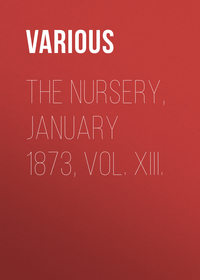Kitobni o'qish: «The Nursery, January 1873, Vol. XIII.»
THE STORY OF THE SPARROWS
WE are little English sparrows. We have been two years in America. We were brought over by Mr. Wakefield's gardener. He let us loose in the grove; and there we have been ever since.
Mr. Wakefield has built little houses for us, and put them on the boughs of the trees. We go into these houses when it rains hard or blows. Once the doors of our houses were all blocked up with snow.
The winters here are much colder than in England, where we were born. More snow falls, and thicker ice forms here. But we like our new home very well.
Many young sparrows have been born to us. They are proud of being Americans. They think they are cleverer than their parents, because their parents, you see, are English. Pride is not right, is it?
There is a bird called the butcher-bird,—a very savage bird,—that tries to kill us. We have to look out for these butcher-birds. But they cannot get into our houses: the doors are too small for them.
There is a little bird called the snow-bird, that comes in winter. We are not afraid of him. He is afraid of us. We drive him away when Emily feeds us all. Emily calls us naughty when we do this: she threatens to punish us for it.
Emily and her folks live not far from our grove. Emily has a father and mother, a grandfather, a brother Philip, and a baby sister, whose name is Nelly. Grandfather and Nelly are great friends. Grandfather brings Nelly in his arms to see Emily and Philip feed us.
One day, just as it had begun to snow, we thought we would fly over and make a call on Emily. She saw us from the window, and came out. Philip came too. They gave us crumbs and seed. Grandfather brought baby to see us. We did not fly off when baby said, "Goo!" We were not afraid.
By and by two saucy snow-birds came, and tried to get some of our seed. We flew at them, and drove them off. But Emily said, "You naughty sparrows! Let those snow-birds be! They are as good as you are, any day."
Now, that was not kind in Emily. We think we are better and handsomer than snow-birds. We were so much offended, that we all flew away, and left her with her precious snow-birds.
But the next day we were hungry: so we forgave her, and made her a visit. She was glad enough to see us. So were grandfather and baby. Those hateful snow-birds kept out of the way.
Old Mr. Sparrow.
THE LITTLE TEACHER
Little Mary is seven years old. She loves "The Nursery." She has read it for nearly three years; and her mother says she has learned more from it than she has learned at school.
At first she used to look at the pictures, and ask her brother Cecil to read to her about them. Oh, how happy they were reading together! By and by she began to try to read the story she had just heard; and soon she learned to read to herself very well.
A black man named John has lived with Mary's father many years. He could not read. Mary felt sorry for John. She thought he would like to read nice stories too.
One day she said, "Mamma, may I teach John to read?" "Yes, dear," said her mother, "if you can."
After tea, Mary's mother looked into the kitchen; and what do you think she saw? John was holding little Mary on his knee, and she was teaching him to read.
She was pointing to the letters, one by one, and trying patiently to make him remember his A, B, C; and John, with his eyes fixed upon the book, was giving close attention to the words of his little teacher. It was a pretty picture.
Mary did not give up trying until John had learned to read, though it took a long time, and she had to give him many lessons. He tried hard to learn; and now he is glad that he can read, and Mary is glad too.
Anna Holyoke.
